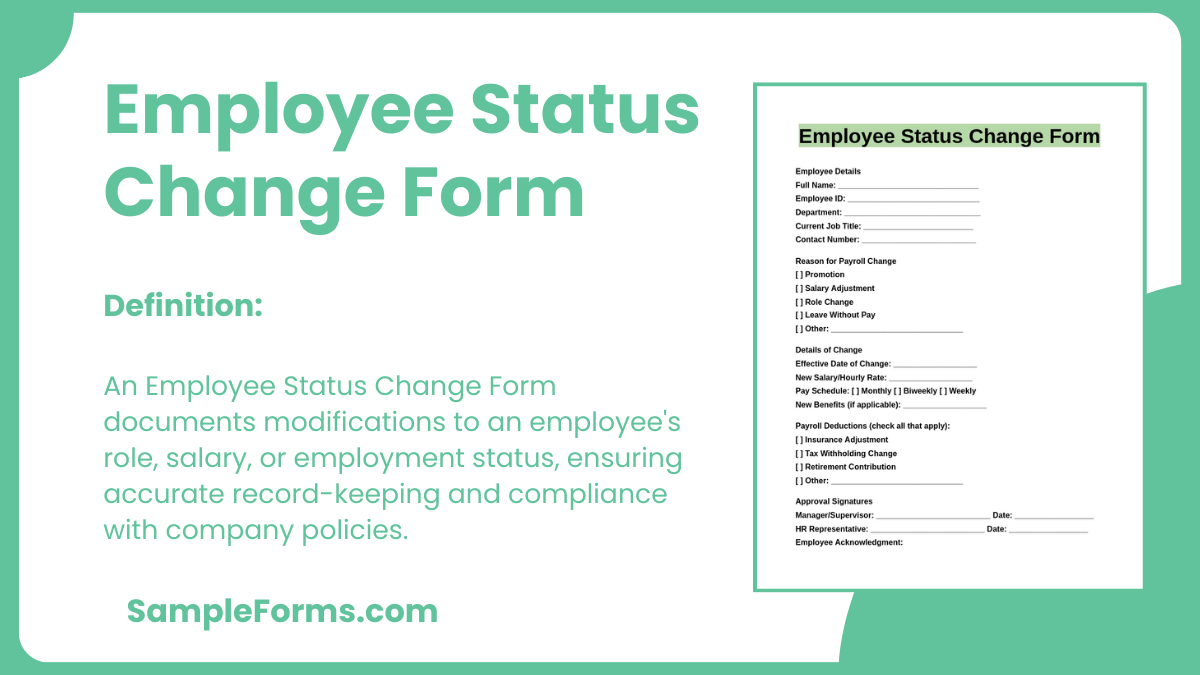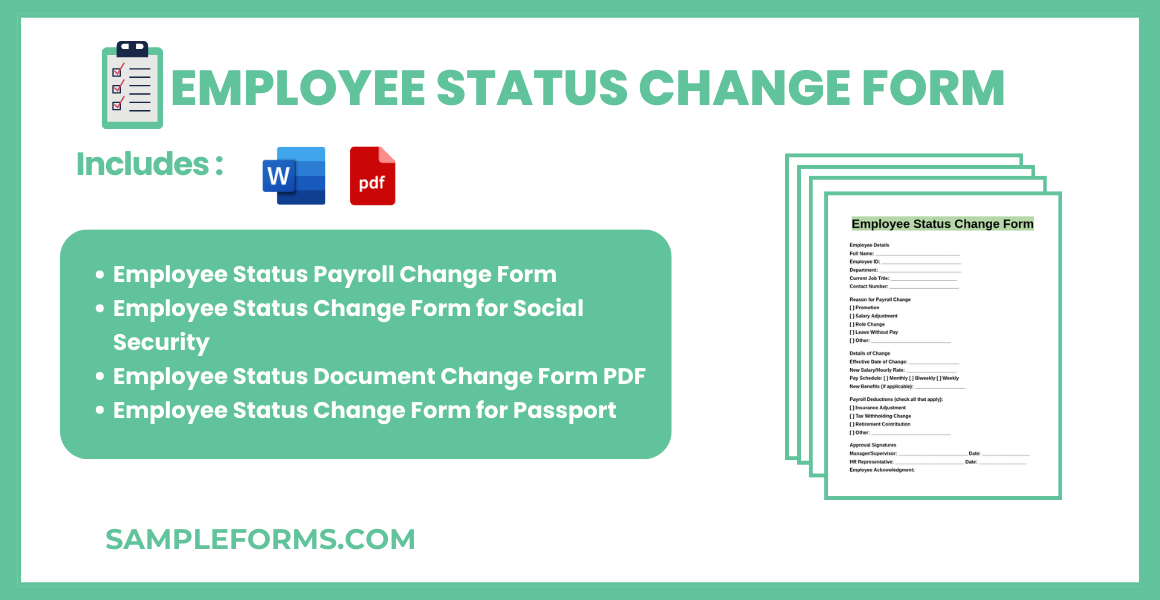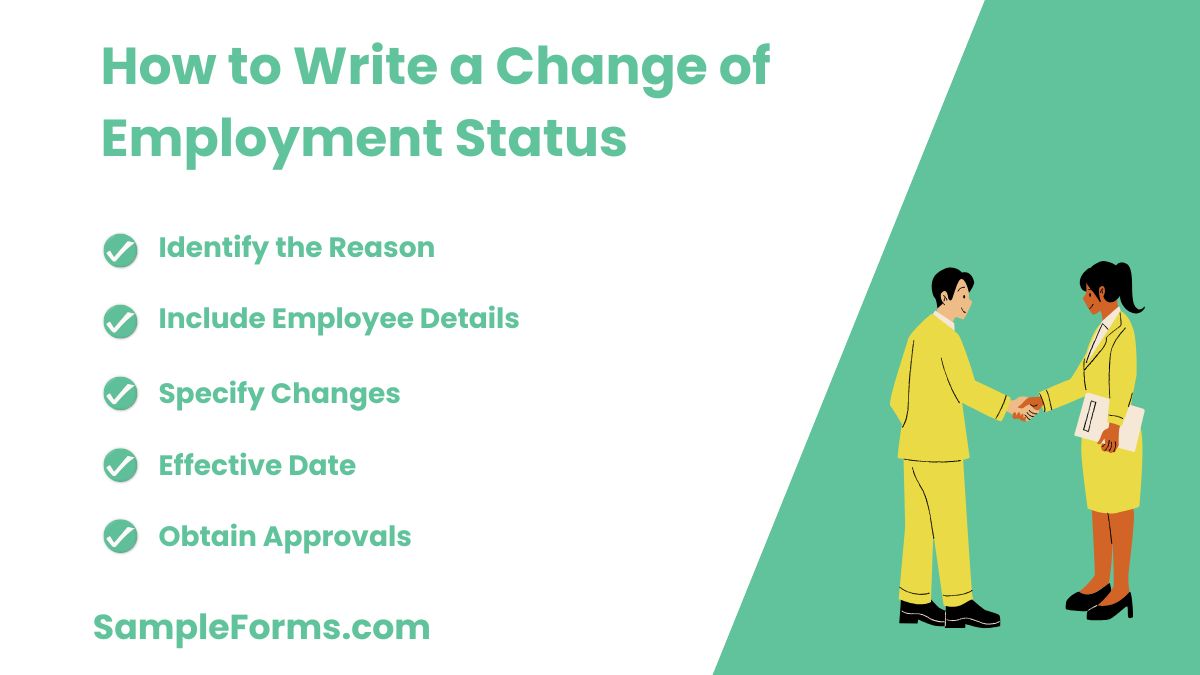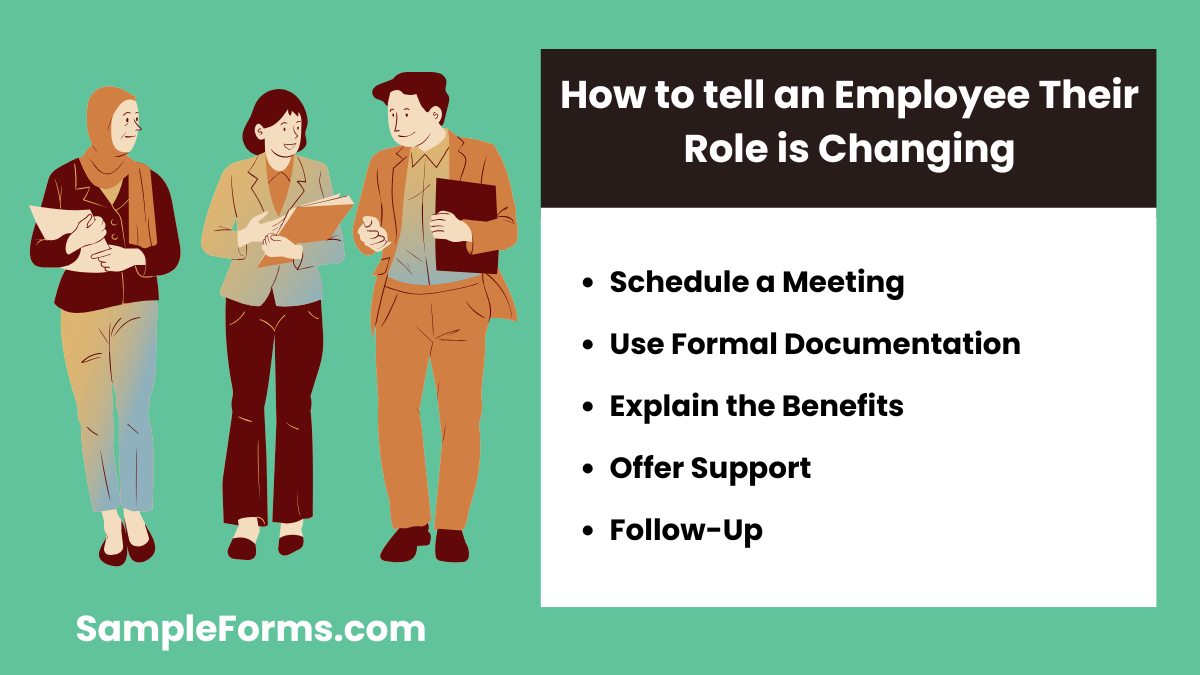Updating employee details can be challenging, but with the Change Form and Employee Form, you can manage these tasks efficiently. An Employee Status Change Form serves as an essential tool in HR, documenting modifications like promotions, salary changes, or department transfers. This guide explores every aspect of this form, providing detailed instructions and real-world examples to streamline your processes. Whether you’re an employer updating records or an employee understanding workplace transitions, this form ensures transparency and compliance. Dive into the guide to master its usage, format, and customization options tailored for your organization’s needs.
Download Employee Status Change Form Bundle
What is Employee Status Change Form?
An Employee Status Change Form is a document used to record and authorize updates to an employee’s job details, such as promotions, demotions, salary adjustments, or terminations. It ensures that HR records stay accurate and complete. This form simplifies communication between departments, preventing errors and ensuring compliance with company policies. By capturing key information like the reason for the change, effective dates, and approvals, it creates a transparent and systematic approach to employee management.
Employee Status Change Format
Employee Information
Employee Name: ___________________
Employee ID: ___________________
Department: ___________________
Current Job Title: ___________________
Manager/Supervisor Name: ___________________
Employment Type: [ ] Full-Time [ ] Part-Time [ ] Temporary
Details of Change
Effective Date of Change: ___________________
Type of Change:
[ ] Promotion
[ ] Demotion
[ ] Department Transfer
[ ] Salary Adjustment
[ ] Termination
[ ] Other (specify): ___________________
Reason for Change:
New Details (if applicable)
New Job Title: ___________________
New Department: ___________________
New Manager (if applicable): ___________________
Updated Salary/Pay Rate: ___________________
Additional Benefits or Allowances: ___________________
Approval Signatures
Manager/Supervisor Signature: _________________ Date: ________________
HR Representative Signature: ___________________ Date: _______________
Authorized Personnel Signature: ___________________ Date: _____________
Employee Acknowledgment
I acknowledge the changes specified above and agree to the updated terms.
Employee Signature: ___________________ Date: ___________________
Employee Status Payroll Change Form
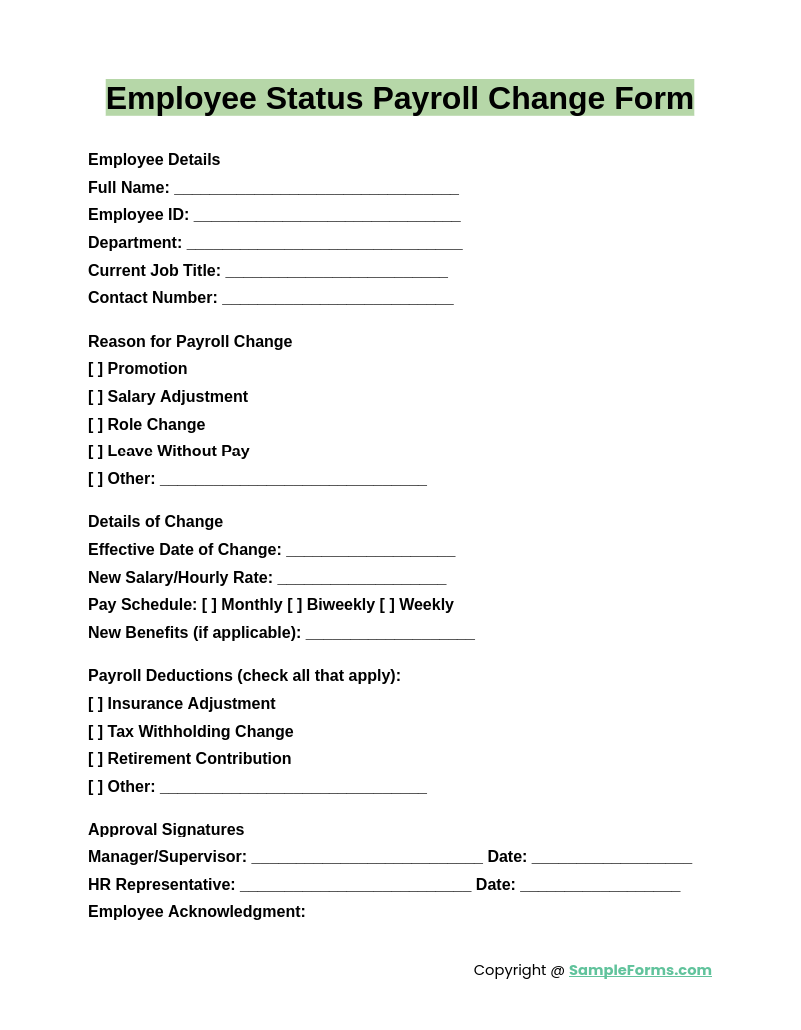
An Employee Status Payroll Change Form is essential for recording updates to an employee’s pay structure. Similar to a Payroll Change Form, it includes salary adjustments, bonuses, deductions, and approvals to ensure accurate payroll management.
Employee Status Change Form for Social Security
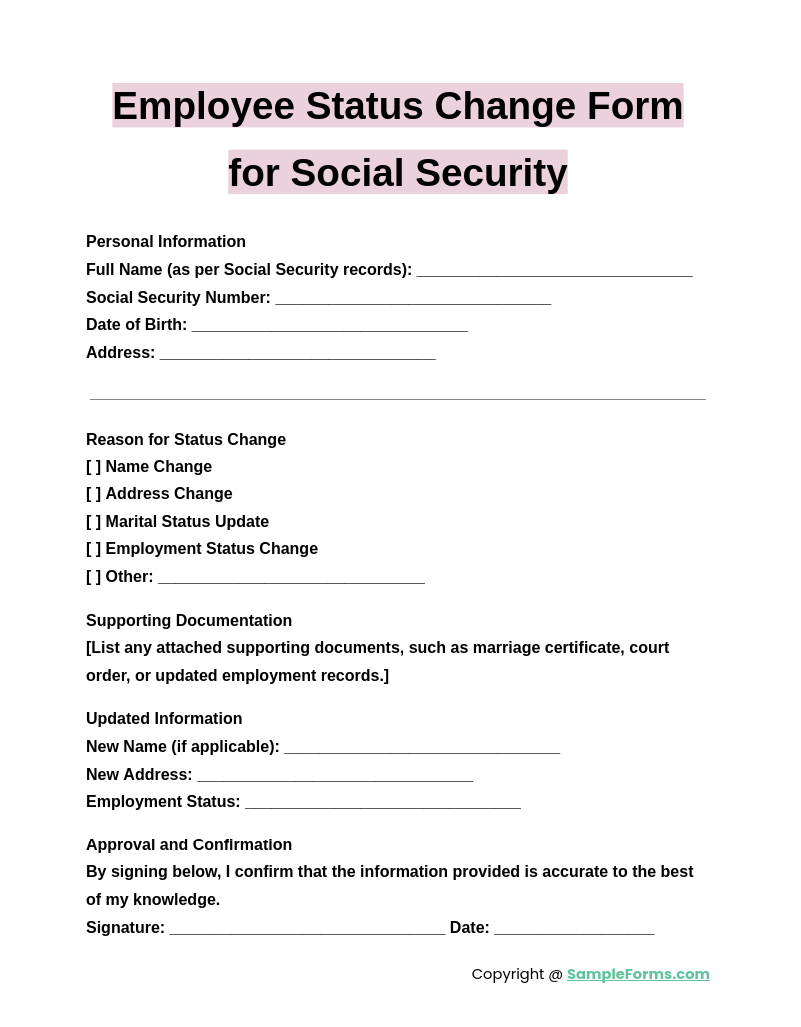
An Employee Status Change Form for Social Security is used to update employment-related details with social security offices. Similar to a Name Change Form, it documents changes like marital status, name updates, or employment type transitions.
Employee Status Document Change Form PDF
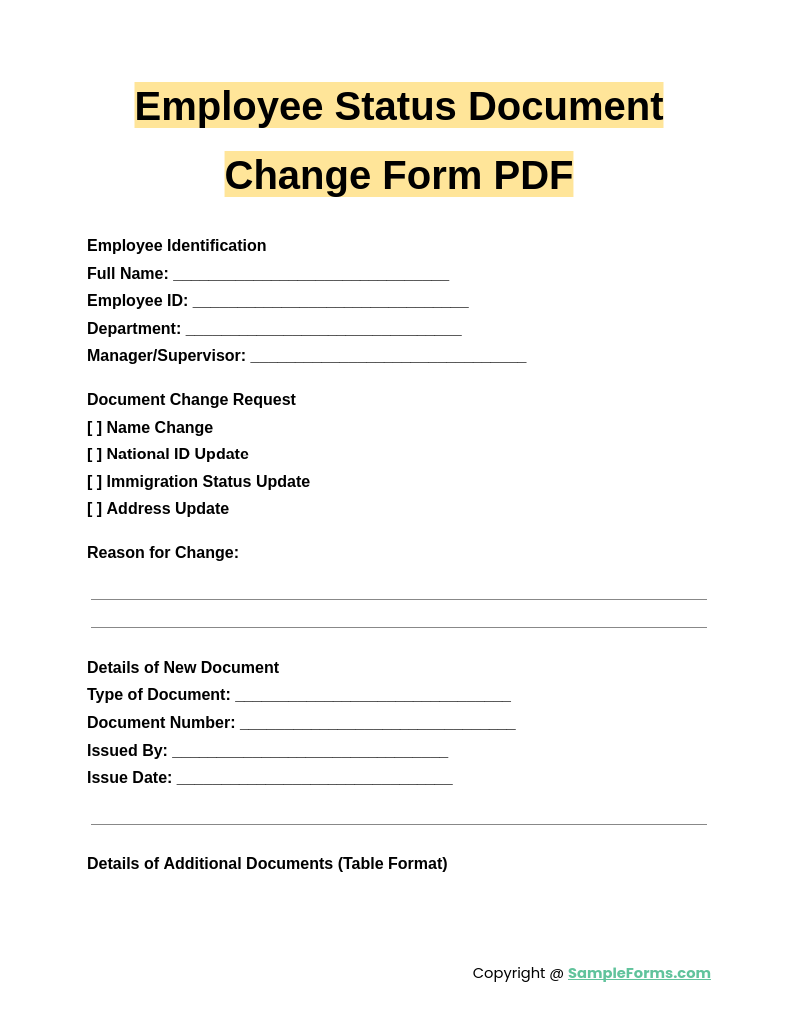
The Employee Status Document Change Form PDF is a digital solution for updating employee details. Similar to an Employee Name Change Form, it records name updates, identification corrections, or departmental transfers, ensuring accurate documentation.
Employee Status Change Form for Passport
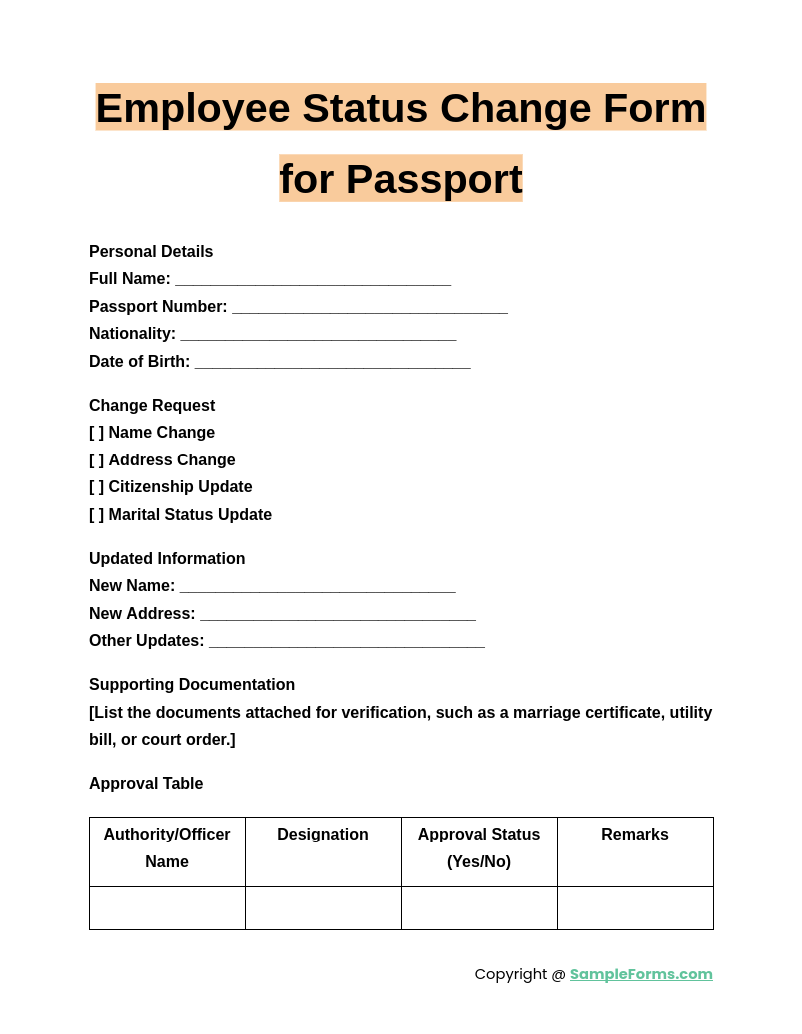
An Employee Status Change Form for Passport is critical for updating job-related passport details. Similar to a Shift Change Form, it ensures employee records align with job and travel requirements, maintaining legal and organizational compliance.
Browse More Employee Status Change Forms
Employment Status / Salary Change Form
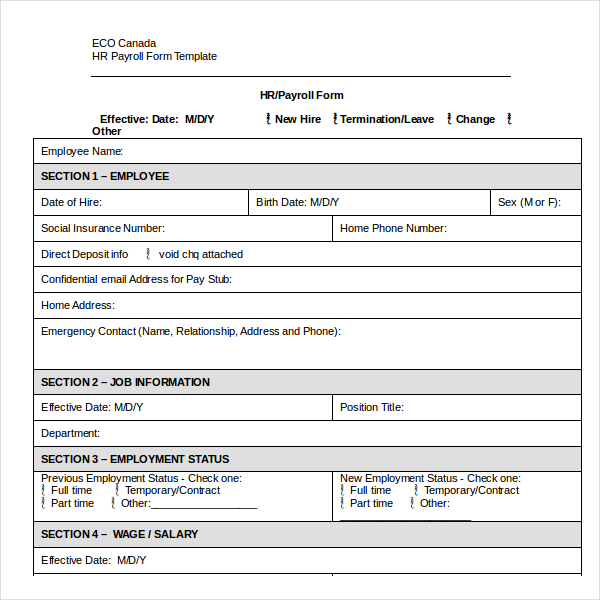
eco.ca
Employee Status Change Form Word Format Download
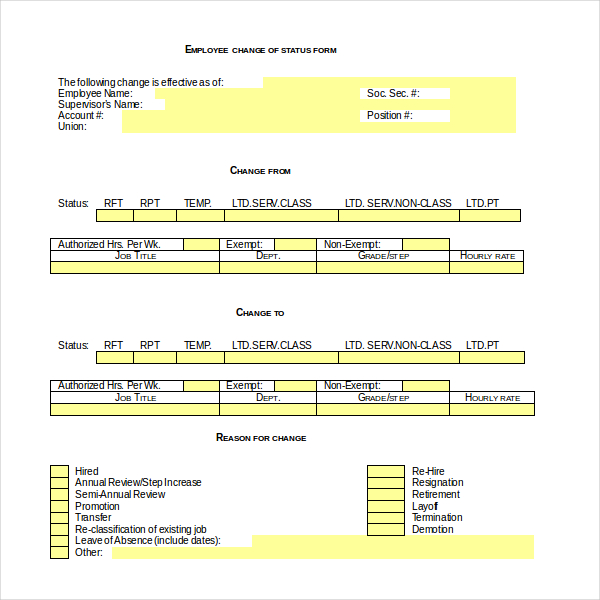
burlingtonvt.gov
Change of Employment Status Form
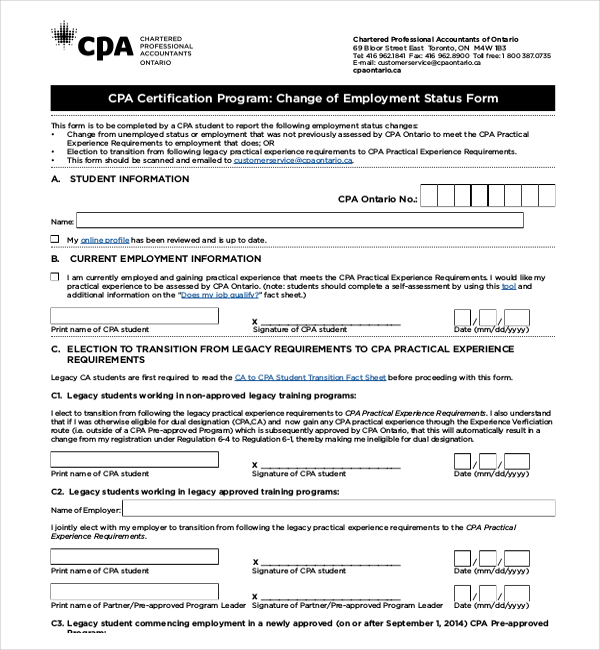
cpaontario.ca
ADP Employee Status Change Form
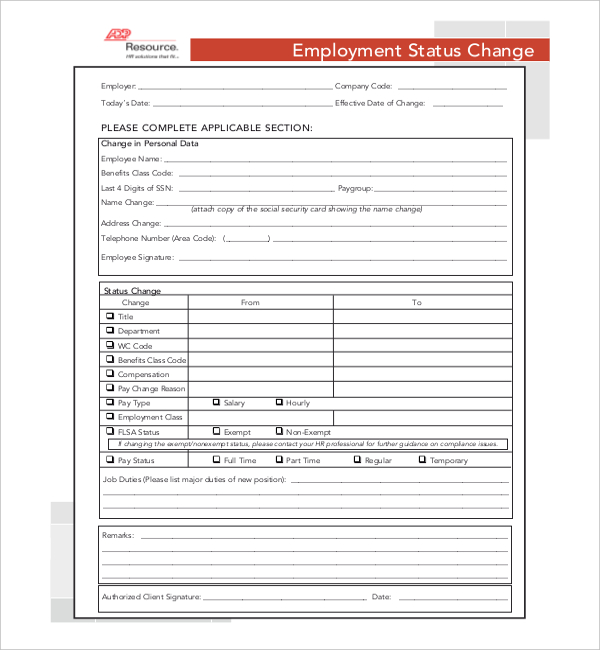
haca.org
Notice to Employee as to Change in Relationship
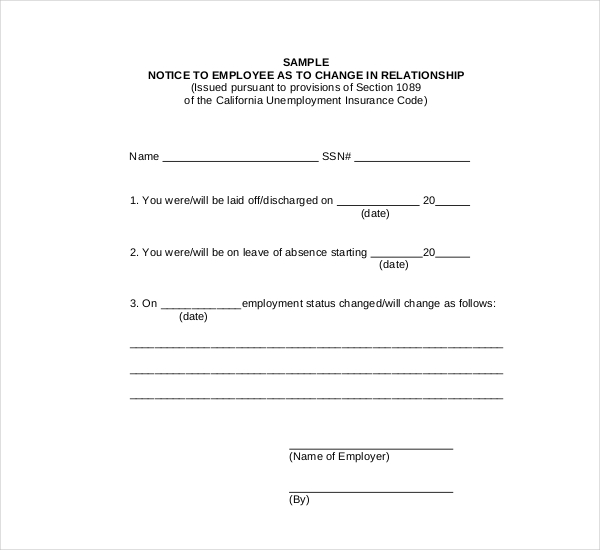
edd.ca.gov
New or Change Employee Status Form
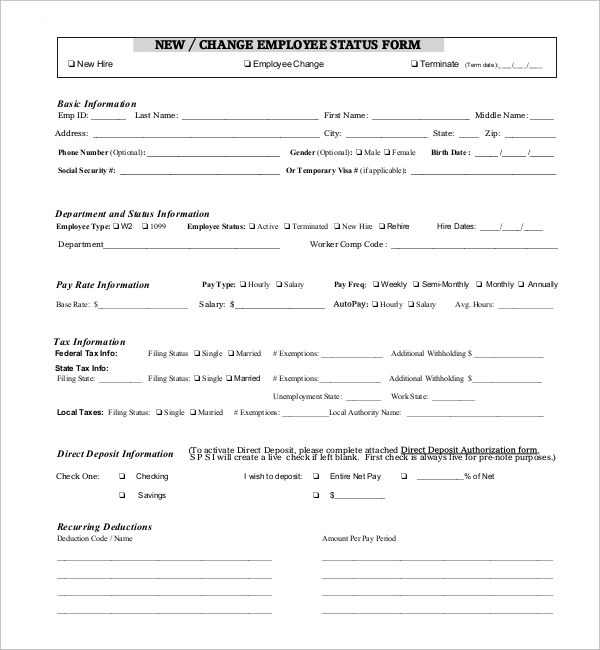
swpay.com
Change of Status Form for Employee
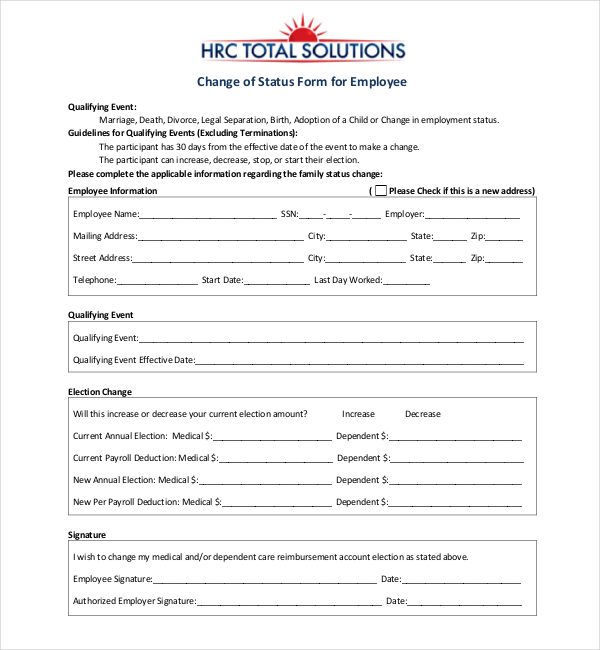
hrcts.com
Employee Change of Status Form Insurance
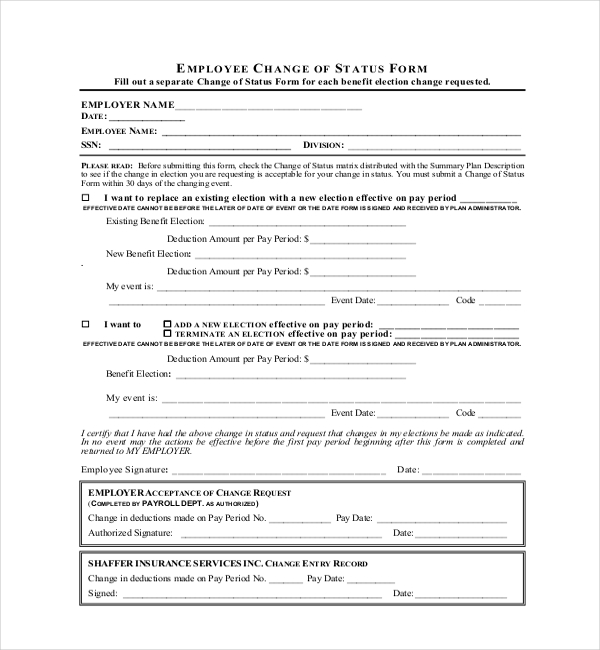
shafferins.com
Standard Employee Status Change Form
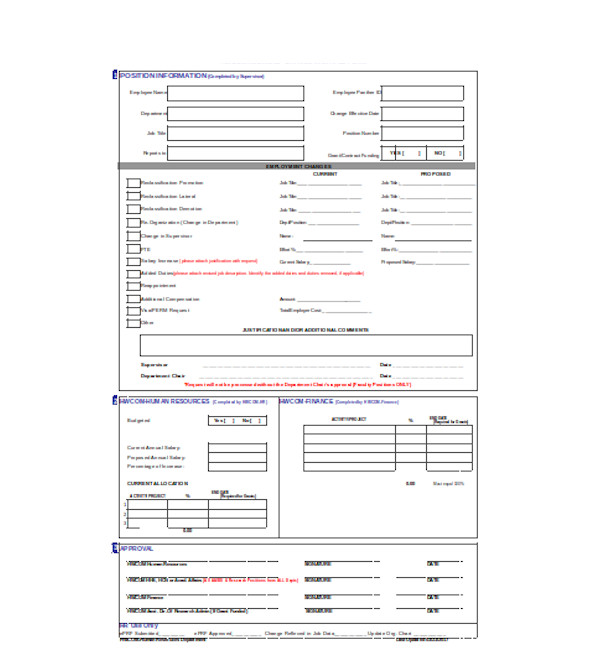
medicine.fiu.edu
How do I write a change of employment status?
Writing a change of employment status involves creating a formal document that outlines the details of the modification. Use a structured approach to ensure clarity and compliance.
- Identify the Reason: Clearly state why the status is changing (e.g., promotion, transfer).
- Include Employee Details: Use an Employee Bio Data Form to gather accurate personal and professional information.
- Specify Changes: Define the new role, salary, or department in detail.
- Effective Date: Mention the date when the change takes effect.
- Obtain Approvals: Secure signatures from managers and HR for final confirmation.
What is a notice to an employee as to change in relationship?
A notice to an employee regarding a change in relationship informs them about modifications in their employment terms or status.
- Draft a Clear Notice: Use an Employee Change Form to document the update.
- State the Change: Describe the modification, such as termination or role adjustment.
- Include Reasons: Provide a clear explanation of the rationale.
- Offer Support: Mention resources available for a smooth transition.
- Deliver the Notice: Share the document in person or via a formal email.
What is considered a change in employment?
A change in employment includes any modification to job roles, responsibilities, or terms of employment, such as promotions or demotions.
- Define the Change: Use an Employee Information Form to record the update.
- Communicate Clearly: Inform the employee about the change in a meeting or written notice.
- Document the Details: Specify the new role, pay, and expectations.
- Update Records: Modify the employee’s file to reflect the change.
- Ensure Compliance: Confirm that the change aligns with company policies and legal requirements.
How do you transition from employee to employer?
Transitioning from employee to employer requires adapting to leadership responsibilities while retaining professional relationships.
- Understand Responsibilities: Know your role and expectations as an employer.
- Update Personal Information: Use a Name Address Change Form to reflect updated business details.
- Develop Leadership Skills: Focus on effective communication and decision-making.
- Build Trust: Maintain transparent relationships with employees.
- Establish Authority: Set clear boundaries and expectations.
How do you tell an employee their role is changing?
Informing an employee about a role change requires empathy and clarity to ensure a smooth transition.
- Schedule a Meeting: Speak privately with the employee to explain the change.
- Use Formal Documentation: Provide an updated Employee Evaluation Form to outline the new expectations.
- Explain the Benefits: Highlight how the change benefits both the employee and the organization.
- Offer Support: Provide resources or training for the new role.
- Follow-Up: Regularly check in with the employee to address concerns and offer guidance.
What form do I need to file for change of status?
To change your employment status, an Employee Write-Up Form may be required to document and initiate the status update process.
How does the status of an employee change?
Employee status changes involve promotions, demotions, or transfers. The Employee Clearance Form helps ensure seamless transitions with proper documentation.
How do I change my workplace status?
Submit a formal request using an Employee Advance Request Form detailing the desired changes, reasons, and supporting documents for approval.
Can a company fire you for dating another employee?
Policies vary; companies might take action if workplace relationships violate the Employee Discipline Form guidelines, especially in cases of conflicts of interest.
Can an employer change your employment status?
Employers can adjust roles or terms, adhering to legal standards, often requiring documentation like an Employee Appraisal Form for justification.
What is the form for status adjustment?
An Employee Self Evaluation Form can accompany status adjustment requests, providing insights into the employee’s performance and suitability for the proposed change.
What is the employee status code?
An employee status code categorizes employment, like full-time or part-time, and is tracked using the Employee Satisfaction Survey Form to ensure engagement.
How much is adjustment of status form?
The cost varies; typically, employers bear the expense, including additional forms like the Employee Nomination Form for managerial approval.
Who Cannot apply for adjustment of status?
Employees under specific legal restrictions or incomplete documentation may face issues, even when using tools like an Employee Feedback Form.
Can an employer change your position without notice?
Employers may alter roles for operational needs but must follow guidelines and justify changes via forms like the Employee of the Month Nomination Form.
An Employee Status Change Form plays a vital role in maintaining organized and accurate employee records. Whether handling promotions, salary changes, or department transfers, it streamlines HR processes and fosters transparent communication. This guide has detailed its structure, benefits, and practical use. Pairing it with other HR tools, like the Employee Emergency Contact Form, enhances your organization’s efficiency. By integrating this form into your workflow, you ensure compliance and a professional approach to managing employee transitions, contributing to a more effective workplace.
Related Posts
-
Employment Status Form
-
FREE 7+ Sample Employee Name Change Forms in PDF | MS Word
-
Employee Shift Change Form
-
FREE 51+ Termination Forms in PDF | MS Word | XLS
-
FREE 5+ Recruiter Performance Review Forms in PDF | MS Word
-
FREE 4+ Payroll Reallocation Forms in PDF | Excel
-
FREE 4+ Employment Eligibility Verification Forms in PDF
-
FREE 4+ Skills Analysis Forms in PDF | MS Word
-
Employment Reference Form
-
FREE 4+ Incorporation Forms in PDF | MS Word
-
New Hire Form
-
FREE 6+ Employee Manual Acknowledgment Forms in MS Word | Pages | PDF
-
Employee Nomination Form
-
FREE 4+ Employee Time Sheet Forms in MS Word | Excel | PDF
-
Employee End of Day Report Form
